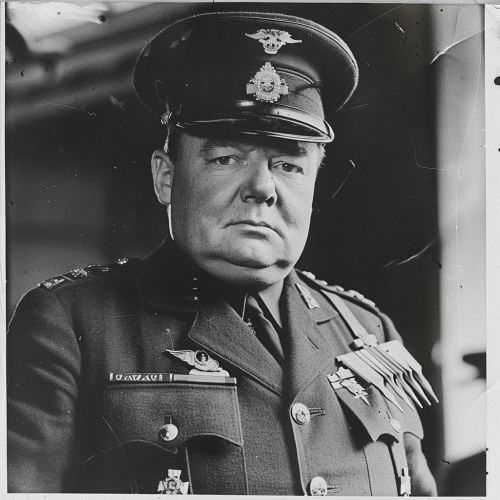Winston Churchill
Early Life
Winston Leonard Spencer-Churchill was born on 30 November 1874 at Blenheim Palace, Oxfordshire, England, the home of his grandfather, the 7th Duke of Marlborough. His father, Lord Randolph Churchill, was a charismatic politician who served as Chancellor of the Exchequer; his mother, Jennie Jerome, was an American socialite. As a young child, Churchill grew up in Dublin, Ireland, where his father was employed by his grandfather who was appointed Viceroy.
Education
Churchill was educated at three independent schools: St. George's School, Ascot, Berkshire; Brunswick School in Hove, near Brighton (the school has since been renamed Dulwich Prep London); and then at Harrow School from 17 April 1888, where his military career began. Despite his parents' hopes that he would go on to attend university, Churchill applied to the Royal Military Academy in Sandhurst, where he graduated 20th out of a class of 130.

Military Career
Churchill saw action in British India, the Sudan, and the Second Boer War. He gained fame as a war correspondent and wrote books about his campaigns. He was elected Member of Parliament for Oldham in 1900. He switched his allegiance from the Conservative Party (Tory) to the Liberal Party in 1904. He was appointed Under-Secretary of State for the Colonies, President of the Board of Trade, and First Lord of the Admiralty as part of the Asquith Liberal government.
Political Career
During the First World War, Churchill was out of government after the disastrous Gallipoli campaign. He returned to government under Lloyd George as Minister of Munitions, Secretary of State for War, Secretary of State for Air, then Secretary of State for the Colonies. After two years out of Parliament, he served as Chancellor of the Exchequer in Baldwin's Conservative government, returning the pound sterling in 1925 to the gold standard at its pre-war parity, a move widely seen as creating deflationary pressure on the UK economy.
Prime Minister
Churchill became Prime Minister on 10 May 1940, the same day the Germans started the Battle of France. He was known for his speeches that inspired the British people. He lost the 1945 election but became Prime Minister again in 1951. He introduced reforms such as the Mines and Quarries Act of 1954 and the Housing Repairs and Rent Act of 1955. His second term was also marked by ill health and his resignation as Prime Minister came in 1955. However, he remained an MP until 1964.
Later Life and Death
In his retirement, Churchill wrote A History of the English-Speaking Peoples and continued to paint, a hobby he had taken up in the 1910s. He died on 24 January 1965 and was given a state funeral, the first for a non-royal person since William Gladstone in 1898.
Legacy
Churchill's legacy continues to be a subject of debate. He is considered one of the greatest wartime leaders of the 20th century, and he won the Nobel Prize for Literature. However, his views on race and his handling of episodes of colonial unrest have generated considerable controversy.
